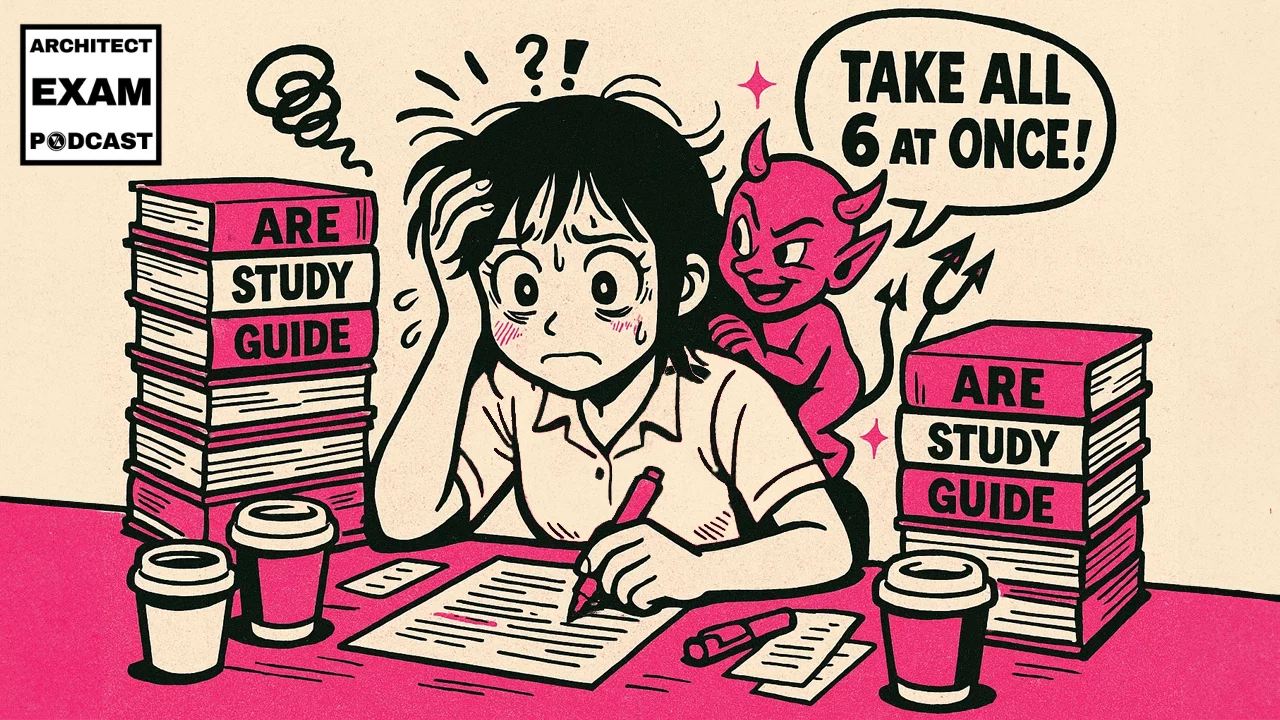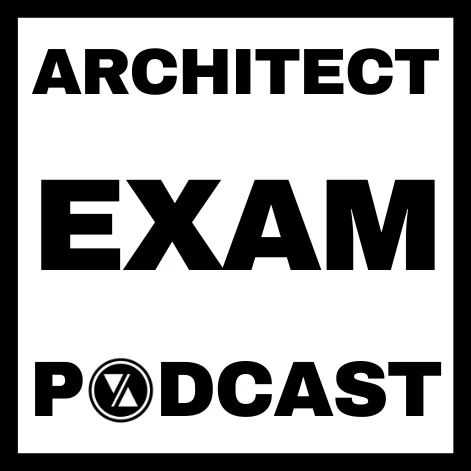Creating a realistic ARE study schedule is the difference between passing your architect exams and burning out before you finish. After helping hundreds of candidates since 2013, I’ve learned how to study better for these exams – and it’s drastically different from what most prep companies tell you.
This podcast is also available on YouTube, Spotify, and Apple Podcasts
Most ARE study schedules fail because they ignore the reality of what it actually takes to pass these exams. Since 2013, I’ve been creating content around the architect exam and helping ARE candidates pass their exams through our ARE Bootcamp program.
A major part of what makes our bootcamp so successful is that it’s broken down into smaller, manageable pieces that allow people to work 40 hours a week, meet their professional responsibilities, raise kids, and handle everything else life throws at them—all while making consistent progress on their architect exams.
Here’s the thing: I’ve seen what works and what doesn’t work, and my advice on how to create a study plan is drastically different from what other ARE prep companies and even NCARB will tell you.
By the end of this article, you’ll understand the reality of what it takes to pass these exams and have a step-by-step approach to creating a study schedule that works for you and your busy life.
Reality Check: What It Really Takes
Before we talk about setting up a realistic ARE study schedule, we need to have a reality check.
There are three important things we need to discuss because if we don’t get on the same page with these concepts, everything else about how to make a study schedule will be useless.
The Time Commitment Involved
I want to start by telling you something I wish someone would have told me when I started studying for my architecture exams: studying and passing ARE 5.0 is a 700-1500 hour project. It is currently taking people between 700-1500 hours of studying and taking exams to complete all six exams.
How do I know this? Because in our ARE Bootcamp, we track study hours the same way we track hours working on projects in the office. According to NCARB’s data, it takes most people about three years to complete all six ARE exams.
When I first started studying for the ARE, no one told me this. ARE prep companies, NCARB, and the AIA told me it would take about six months and what sounded like 200 hours of studying. Boy, were we all wrong.
It took me 1800 hours and 4.5 years to pass my exams.
But you know what really dictates your ARE study schedule and timeline more than anything else? What’s going on in your personal life:
- How busy are you at work?
- Are you moving?
- Going through a breakup?
- Changing jobs?
- Having a kid?
- Do you ever get sick?
- Go on vacation?
- Religious holidays?
- How much overtime does your boss make you work?
All of these things are going to dictate how fast you complete the architect exam. Before we talk about setting up a study schedule, I need to ask: do you even have time to study for this architect exam?
This is a very time-consuming task. If you don’t have a lot of study time available to dedicate to the ARE, you’re basically wasting your time trying to jam this extremely time-consuming activity into your busy life.
You’ll Probably Fail a Few Times
On top of the huge time commitment involved, you need to understand that you’ll probably fail a few times. NCARB has decided to set the pass rates for ARE 5.0 to be the lowest they’ve ever been. When your boss took the ARE 30 years ago, the pass rates were around 75-85%, but today the test is three times bigger and the pass rates are around 50-65%.
I regularly see people who have studied very hard and are well-prepared to pass their exams, but they show up to take a test and later find out they didn’t pass. This is normal.
I personally failed four times before finishing my exams. Emily, Lorenzo, Layla, and everyone at team Young Architect—we’re all licensed architects now—but we all failed multiple times too. Almost everyone in our Bootcamp fails at least a few times. In fact, nearly everyone I know who made it to the finish line and got their license failed several times to get there.
If you’re serious about becoming a registered architect, you’ll probably fail three to six exams before you pass them all. The reality is that most people can’t handle failing an exam they studied really hard for and keep going.
But here’s the good news: remember when I said it takes 700-1500 hours to pass all your exams? Well, if you studied hard for PcM but didn’t pass it, you still made substantial progress toward studying for PjM. Go take PjM and CE next, and you’ll immediately see you’ve already done half the studying. When you come back to retake PcM after taking PjM and CE, it won’t take nearly as long as it did the first time.
All that time you spent studying for a test you didn’t pass wasn’t a waste at all. It counts toward the total hours it will take you to pass all your exams.
Time Is More Valuable Than Money
When it comes to studying for the architect exam, your time is significantly more valuable than your money. Time is the key ingredient to finding success with these exams. Having lots of money to buy every book, video subscription, and bootcamp will mean nothing if you don’t have time to work with.
It’s easier to find and make more money than it is to find and make more time.
The longer we drag out this process of completing the architect exams, the longer it’s going to hold you back from moving forward in your career and in your life. My life drastically changed in a positive way once I finished my ARE exams.
Getting your architecture license will easily be the most important project you ever work on in your entire architecture career. Completing this project is more valuable than any client, employer, project, or AIA Award because it impacts the rest of your career moving forward once the process is over.
Step-by-Step Approach to Creating a Study Plan
Step 1: Show Up Every Day
This is the foundation of creating a realistic ARE study schedule. Remember those 700-1500 hours I mentioned earlier? This is how you actually log those hours—by showing up consistently.
This is the most important ingredient when it comes to passing the architect exam. Everything else is secondary. Start showing up every single day and doing something study-related. Make it non-negotiable.
The key is transforming studying from an “event” into a “habit” or “routine” in your life.
If you have a busy day at work or something crazy going on, that’s fine. You don’t need to sit and read a book for two hours every time. Instead, find something easy to work on—look something up on the internet, review flashcards for 10 minutes, do a few practice questions on your phone while waiting in line.
When you’re setting up your ARE study schedule, focus on being consistent. Small actions every day are more powerful than marathon sessions once a week. The best time to study is whenever you can show up consistently – whether that’s early morning, lunch breaks, or evenings.
Constantly and consistently be making moves forward, even if they’re just baby steps. Some days you’ll have time for deep study sessions, but regardless of what happens, always keep moving forward. All those little baby steps compound and start to add up over time.
If you can’t consistently figure out how to study at least 8-12 hours minimum per week, I wouldn’t recommend trying to study for the ARE. In our ARE Bootcamp, candidates are averaging 15-18 study hours per week, and we have many people putting in 20+ hours weekly while also working full-time jobs, raising kids, and juggling everything else life throws at them. They’re able to achieve this level of consistency by following structured strategies that maximize their study effectiveness.
They’re able to do this because they’ve made studying a daily habit rather than a special event they need to prepare for.
Step 2: Understand What You’re Actually Studying For
Now that we’ve created time for studying, let’s make those hours count by getting crystal clear on what you actually need to learn. One of the most powerful things we do in our ARE Bootcamp Program is getting really clear about what NCARB is going to be asking questions about.
This single step can save you hundreds of study hours by focusing your efforts.
NCARB publishes a document on their website called the ARE Guidelines. This is your roadmap. It breaks down each exam into different sections and further into specific objectives. These objective statements literally tell you exactly what topics NCARB will ask you questions about. No guesswork required.
The ARE Guidelines also list the references NCARB used to write the questions. This is gold—it’s like getting a peek at their answer key. When the folks at NCARB write the exam questions, they open up to an objective, read it out loud, and say, “Maybe we should write a question about this thing.”
NCARB is literally telling you what they’re going to test you on.
When you thoroughly understand the test objectives, it empowers you to reverse engineer your studying. This is how NCARB intended for you to study for these exams, and this is the ARE study approach Young Architect has always promoted.
Let me be very clear:
If you’re not studying NCARB’s objectives, you’re not studying for the architect exam.
Lots of ARE prep companies will tell you not to worry about test objectives because they “figured it all out for you,”
…but I’m here to tell you the sooner you start worrying about NCARB objectives, the faster and more effective your studying will be.
Also pay attention to the books NCARB used to write the questions for their exams. Not every book on NCARB’s list is equally helpful, but there are several must-haves:
For the practice exams, you absolutely need the Architect’s Handbook of Professional Practice (AHPP). Our ARE 101 courses break down these source materials and NCARB objectives into digestible, focused study sessions.
For technical exams: Architect Studio Companion, Mechanical and Electrical Equipment for Buildings (MEEB), and Heating, Cooling and Lighting.
There is no substitute for these resources. No ARE prep content replaces actually using these source materials (Young Architect Academy Included).
Spend the first few weeks of your study journey digging deep into understanding the objectives before you start investing lots of money in ARE prep study materials.
Step 3: Create a Balanced Learning Approach
Once you know what to study, it’s time to think about how you’re going to learn it. There are two types of studying: hard work and easy work.
Hard work studying is when you’re actively doing the heavy lifting: writing practice exams, solving problems, making your own study notes, teaching concepts to someone else, or creating flashcards. This is where your brain is fully engaged and working hard to process information.
Easy work studying is when you’re more passively consuming information: watching videos, listening to podcasts, or casually reading. It’s like watching someone else do the heavy lifting while you observe.
Both types of studying are valuable when used correctly. Hard work studying will get you to your goals faster and create deeper understanding. Easy work studying helps you maintain momentum and fits into those smaller pockets of time we talked about in Step 1.
The level of understanding you get from watching a video about something versus explaining that same concept to someone else is drastically different. When you explain something to others, you discover the gaps in your own knowledge quickly.
What works best is combining different learning methods throughout your study plan: reading, watching, doing, and teaching. Don’t limit yourself to just one ARE prep company or resource. Use everything that will help you learn. Sometimes the best ARE prep study materials aren’t even marketed as ARE prep materials.
There’s also enormous value in study groups and community learning. You’ll learn faster by talking about these concepts with others—that’s one of the biggest benefits of our Bootcamp. When you have to articulate a concept to someone else, you simply understand it better.
Step 4: Make Smart Test Date Decisions
I don’t recommend scheduling exams until you’ve done about 50% of the work needed to properly prepare for the test. Get the ball rolling first. Your personal life will dictate the schedule more than anything else. It’s easier to look at what’s going on four to six weeks into the future versus 12-16 weeks ahead.
Scheduling exams before you’ve done any work creates unnecessary stress. It doesn’t make sense to commit to a date when you haven’t even started studying yet. NCARB doesn’t give you a discount for scheduling exams early.
You have a lot of work to do, so start doing the work. As you make progress and gain an understanding of what it will take to get to the finish line, then schedule your exams. Make some progress first so you can make the most educated decision on picking a test date.
Step 5: Master the Final Week Strategy
The week before your exam is crucial, but many candidates make a critical mistake here. They panic, grab a new practice exam they’ve never seen before, do poorly on it, and then completely freak out. This is exactly what you don’t want to do.
No new study materials in the seven days before your exam. Instead, spend this final week getting a deeper understanding of what you’ve already been studying. It’s review, review, and more review. Re-read your notes and summaries, review flashcards of concepts you’ve already created, look back at practice questions you’ve completed, and strengthen your understanding of topics you know are on the exam.
The goal in this final week isn’t to cram or second-guess all your hard work. It’s to consolidate what you’ve learned and build confidence in your preparation.
Common ARE Study Schedule Mistakes
Experience Doesn’t Equal Exam Success
Professional experience doesn’t translate to exam success the way many people think. While your work experience might help with a handful of questions, the ARE covers such a broad range of topics that nobody’s work experience covers everything. What actually matters most is your ability to focus, concentrate, and study consistently.
I’ve seen 20-year veterans struggle with these exams while recent graduates pass them because the graduates had better study habits. When crafting your ARE study schedule, don’t reduce your study time based on your experience level—the exam doesn’t give you credit for years in the field.
The “Study All 6 Exams at Once” Trap
Many ARE prep companies promote this approach because “pass all exams in 30 days or 16 weeks!” sounds a lot better in marketing than “this will take you 700-1500 hours over several years.” But it’s simply not realistic for most people.
Think about it this way: would you try to master playing violin, piano, drums, electric guitar, saxophone, and harmonica all at the same time? Each requires completely different techniques, muscle memory, and focused attention to detail. You’d end up mediocre at all six instead of excellent at any one.
That’s exactly what happens when you try to study for all six ARE exams simultaneously. Each exam covers vastly different content areas that require deep, focused understanding. For instance, mastering preconstruction activities for the Construction Evaluation exam requires completely different knowledge than understanding programming concepts for the PA exam. Your brain simply can’t retain the enormous amount of detailed information required for six different exams at once.
This strategy has an extremely low success rate in practice. What’s particularly frustrating is that the companies promoting this approach profit whether it works or not—they’ve already collected their money months before anyone realizes this strategy doesn’t work. In our ARE Bootcamp alone, I’ve worked with dozens of students who tried this approach first, many spending three to four times what our entire program costs on various prep materials and failed exam fees.
Sadly, when people fail this badly, many never come back to studying at all—which is the worst possible outcome. As someone who personally coaches candidates, I think it’s reckless to give out this advice.
If your goal is to complete the ARE quickly and efficiently, here’s the real shortcut I’ve seen work over and over:
- Study NCARB’s objectives thoroughly.
- Learn how to read the textbooks NCARB used to write the exam.
- Focus on being thorough and efficient with each individual exam.
Taking them seriously one at a time will get you to the finish line so much faster than trying to shortcut a process that can’t be shortcut.
Measuring Calendar Time vs. Actual Hours
“I’ll finish my exam in 30 days” doesn’t mean anything if you’re only studying five hours a week. That’s just 20 hours of total study time—nowhere near enough for most exams. This is why tracking your progress in hours worked is so much more meaningful than tracking calendar days.
Use a timesheet for your studying just like you do for projects in the office. Log your hours, note what you accomplished, and watch your progress in terms of actual work completed. This approach gives you a much more accurate picture of your progress and helps you make realistic projections about when you’ll truly be ready to test. Think of it as your study timeline that’s based on real work, not wishful thinking.
The Mindset That Changes Everything
The most powerful tip I can share about maintaining your ARE study schedule isn’t a productivity hack or time management technique. It’s a fundamental shift in how you think about studying for the ARE.
Stop studying to pass a silly NCARB exam and start studying to become a great architect.
I learned this lesson the hard way. The first few years of my studying were all about hacking the ARE and finding shortcuts to pass my exams. I saw studying as this tedious chore standing between me and my license. And guess what? It made showing up to study incredibly difficult.
But then something changed. I started to see how the knowledge I was gaining directly improved my work in the office, enhanced my projects, and transformed my relationships with clients. I began to understand architecture not just as a design discipline, but as a business and an industry.
Halfway through my exams, I stopped studying for NCARB’s tests and instead embraced a new goal: to become a truly great architect who could level up my career, impact, and income. And suddenly, showing up every day became so much easier.
This is the magic mindset shift. When you realize the ARE isn’t testing arbitrary information but the exact knowledge you need to excel professionally, studying becomes fascinating rather than frustrating. The topics you’re studying aren’t just test material—they’re the foundation of your future success.
This mindset shift is why soo many ARE candidates started pursuing CDT certification to further deepen their understanding of the construction industry.
Think about it: every topic in the ARE directly translates to your daily work. What you’re studying isn’t arbitrary test material—it’s the foundation of professional excellence that will serve you throughout your entire career.
Lean into this. Become fascinated with this material. Ask yourself how each concept applies to your current work or the projects you want to work on in the future. Be curious about how the best architects in your firm apply these principles.
When your goal shifts from “pass this test” to “become exceptional at my craft,” consistency follows naturally. You’re no longer cramming information for an exam—you’re investing in your professional identity and future.
Creating Your Path Forward
Building a realistic ARE study schedule comes down to being honest about what’s happening in your life, understanding what you’re actually studying for, and approaching the process with the right mindset. Include buffer time for unexpected events, prepare mentally for setbacks, and adjust as you go—flexibility is essential. The most efficient way to study is to combine consistent daily habits with deep understanding of what NCARB actually tests.
Remember: this isn’t just about passing tests. The ARE is your pathway to architectural excellence and the most important project you’ll work on in your entire architecture career.
If you’ve been struggling with making progress on your exams, I’d love to help you discover this transformative approach for yourself. Our community of candidates at the ARE Bootcamp has found that this mindset makes all the difference. We provide the structured curriculum, accountability, and support system that turns this overwhelming process into manageable, consistent progress.
Visit youngarchitect.com/arebootcamp to learn how we can work together to not just pass your exams, but transform you into the architect you’ve always wanted to become.



